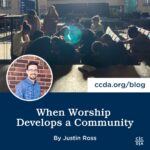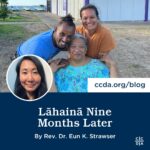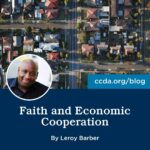Wellington Heights Community Church was birthed out of our family’s living room as a group gathered to consider what it looks like to love God, neighbor, and neighborhood. We structured our time with prayer and discussion on CCDA Immerse, discerning what it may look like to embody the CCD components in our context.
Two weeks into gathering, the COVID-19 pandemic swept across the globe, followed by an awakening of many to the twin pandemic of systemic racism. Shortly after, a Derecho, also known as a land hurricane, devastated our community and left the Wellington Heights neighborhood without power for nearly two weeks.
Within all of these circumstances, we grounded ourselves as a church embodying the CCD components as we cared for, advocated for, and held space for one another. The Civil Rights movement and our experience with spiritual formation in our circumstances revealed to us that faith is authentic when it stays close to the ground, to the people. These experiences collectively reminded us of our faith’s affirmations: to show hospitality to strangers and outcasts, to affirm the dignity of all people, and to embody love, justice, and mercy.
Through our collective experiences, the verse from Isaiah 43:19 continued to surface:
Look! I’m doing a new thing;
now it sprouts up; don’t you recognize it?
I’m making a way in the desert,
paths in the wilderness.
Embracing New Ways of Gathering
We sensed the movement of God’s Spirit to expand our idea of what church looks like through diverse forms of gathering, not just within the circumstances of 2020 but beyond as the new normal for our community. We saw the beauty and fruit of embracing the new as this approach allowed space for unlikely people to come together to be inspired to work together for the flourishing of our neighborhood and, through it all, even become curious about the abundant love of God.
Although we now have a building, our community still embraces new ways of gathering through prayer and peace walks, neighborhood clean-ups, and block parties. We have traditional Sunday gatherings and also create space for community art projects or engaging with new spiritual practices together as a community.
Embracing a non-traditional approach to church has led us to a more abundant life. It’s an approach I am thankful to be part of. Perceiving the new thing that God is doing among us has required a long-haul commitment to presencing and listening with sacred curiosity, particularly when it stretches or expands us.
Embracing Listening to the Community
In January 2024, we are entering into the next phase of listening with and co-creating with our neighbors through the Flourishing Neighborhood Index in partnership with the Lupton Center. The FNI is an 18-month process that will guide us as a neighborhood and faith community in what our next steps may be after a period of listening and discussion.
A frequent comment that many of us may have heard or even have said is that the local church is either an absent or an unfriendly neighbor, more focused on their own image and growth. All too often, the church and pastors seek to build their own prosperous, flourishing empire, and as a result, the church is not present with their community and has become irrelevant with respect to listening to and addressing the needs of the people and community around them. This is not a good look for the church!
Collectively we find ourselves in a unique moment in history. The next generation is over the hypocrisy, the self-focused faith practices, the conquering us vs. them mentality, and the obsession with who is in and out. The next generation is waiting for us to activate our commitment to the way of Jesus, in the here now.
It is time to restore the credibility of the church!
The church’s responsibility is not limited to only spiritual development and nourishment, but from the command of Jesus, it is also the responsibility of churches to love and care for and work for the well-being of their neighbors and neighborhoods.
I believe that any community of faith can be an anchor and agent of peace and flourishing in any community. And CCDA provides for us a guide beginning with being present and engaging with holistic listening. Listening to God’s Spirit, to our neighbors and also listening to ourselves and our bodies while participating in the important practice of soul care.
Embracing our Connectedness
Our eight-year-old son has had a deep interest in learning about the life of Civil Rights leaders, particularly John Lewis and Dr. Martin Luther King Jr. He often says that he hopes our family and others can get into what John Lewis calls “Good Trouble,” so that all people can flourish.
In his learnings, our son noticed and was curious how prayer sustained and inspired the leaders to continue on toward the vision of God’s Beloved Community.
A particular quote from Dr. King stands out as he shared a message to the white South – “We will wear you down by our capacity to suffer. We will meet your physical force with soul force.”
Soul force is what carried this movement forward. It is not human striving but rather the fruit of a deep connection to God and one another. Soul force gave the many women and men of this movement the ability to love and continue forward in God’s vision even in the midst of deep suffering.
Dr. King said that “an individual has not started living until they can rise above the narrow confines of their individualistic concerns to the broader concerns of all of humanity.”
The vision of justice and peace is made clear as we understand our connectedness; that if one of us is suffering, we are all suffering. Our liberation is bound together. It requires a commitment to see the sacredness in the other, to feel the world from their perspective, and to place ourselves alongside one another in this work.
Dr. John Perkins refers to this movement as the “quiet revolution.” This movement that Dr. Perkins has embodied and inspired helps us understand the theological roots and the Body of Christ’s responsibility in work toward the beloved community, “God made His love visible to the world in the person of Jesus Christ. And Jesus Christ made His love visible to the world in His unselfish death on the cross for our sins. So it becomes our responsibility as the Body of Christ to live out His life on earth as to make the love of God visible in our time. And in our community.”
Embracing the New Thing God is Doing
We see time and time again that people notice when a church actively listening and being present with the community. Now is the time for the church to embody holistic faith practices that lead to the renewal of the church’s mission to take part in being present with our neighborhood by listening with sacred curiosity and commitment of presence for the long haul.
L.D. Kidd and Nora Heaton have been inspired by this approach and have created a spoken word, “We, Us, Ours,” and the song, “Love Thy Neighborhood,” to guide us to move beyond individualistic faith practices toward the interconnectedness of humanity to commit to the new movements of God among us.
God, you have shown us your ways of compassion and justice. Forgive us for being so caught up in our own lives. Forgive us for not having eyes to see and closing them when we don’t want to see. Forgive us for not having ears to hear and covering them when we don’t want to hear.
Revive your church. Renew us and remake us.
Jesus, you modeled sacrifice and love for neighbor. Deliver us from our faith practices rooted in individualism and consumerism. Deliver us from fear that keeps us from taking risks to holistically care for our neighbors and neighborhood. Deliver us from our obsession of who is in or out within our faith communities.
Revive your church. Renew us and remake us.
Holy Spirit, you promise to root, strengthen and guide us. Fill us with courage to continue on the journey we feel weak. Fill us with assurance that you are working in ways that we can’t always see. Fill us with power to listen and love and be the church you are making us to be.
Revive your church. Renew us and remake us.
Amen.
About Stephanie Carter

Stephanie Carter is the co-founder and Spiritual Formation and Teaching Pastor of Wellington Heights Community Church, a multicultural faith community based in Cedar Rapids, IA that is committed to joining God in the restoration of all things through worship, reconciliation and neighborhood development. Stephanie and her husband have two children who fill their home with laughter and share a passion alongside their parents in welcoming others into the vision of the Beloved Community.
Welcoming Justice: God’s Movement Toward Beloved Community by Charles Marsh and Dr. John Perkins
His Truth Is Marching On: John Lewis and the Power of Hope by Jon Meacham and John Lewis (afterward)





